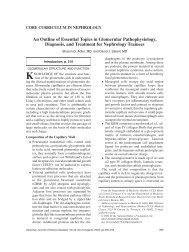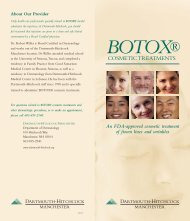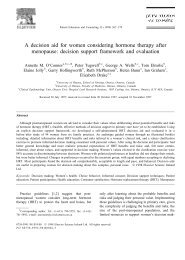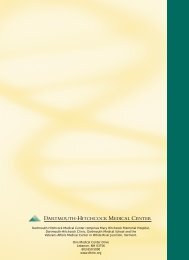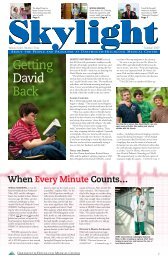Surgery and Healing in the Developing World - Dartmouth-Hitchcock
Surgery and Healing in the Developing World - Dartmouth-Hitchcock
Surgery and Healing in the Developing World - Dartmouth-Hitchcock
Create successful ePaper yourself
Turn your PDF publications into a flip-book with our unique Google optimized e-Paper software.
International Surgical Education<br />
These “exotic illnesses” usually require great sophistication on <strong>the</strong> part of <strong>the</strong> cl<strong>in</strong>ician<br />
<strong>in</strong> an area <strong>in</strong> which <strong>the</strong>y are not prevalent; however, <strong>the</strong> practitioner <strong>in</strong> <strong>the</strong> rural<br />
sett<strong>in</strong>g at a small hospital that is devoid of technology is often better qualified to<br />
<strong>in</strong>terpret <strong>the</strong> mean<strong>in</strong>g of an acute abdomen accompanied by icterus, fever, <strong>and</strong> upper<br />
abdom<strong>in</strong>al tenderness <strong>in</strong> terms of common disease prevalence.<br />
There is an unfortunate trend toward <strong>the</strong> acceptance of lower st<strong>and</strong>ards for <strong>the</strong><br />
practice of medic<strong>in</strong>e under <strong>the</strong> slogan of a more “nationalistic medical care” for <strong>the</strong><br />
less privileged nations of <strong>the</strong> world. Yet, we must face reality. Many nations cannot,<br />
even remotely, hope to duplicate <strong>the</strong> technological sophistication of <strong>the</strong> educational<br />
<strong>and</strong> service <strong>in</strong>stitutions of <strong>the</strong> <strong>in</strong>dustrialized nations. What solutions are possible to<br />
stretch <strong>the</strong> limited resources over <strong>the</strong> larger dem<strong>and</strong>s? It appears clear that geographic<br />
pathology has a socioeconomic connotation that cannot be overlooked. The<br />
concepts of cl<strong>in</strong>ical epidemiology <strong>and</strong> population-based medic<strong>in</strong>e must permeate<br />
medical teach<strong>in</strong>g, health plann<strong>in</strong>g, <strong>and</strong> service adm<strong>in</strong>istration. Surgical tra<strong>in</strong><strong>in</strong>g programs<br />
<strong>in</strong> a develop<strong>in</strong>g country must <strong>in</strong>clude sufficient exposure to such aspects of<br />
“general surgical care” as trauma, orthopedics, urologic problems, pediatric surgery,<br />
<strong>and</strong> obstetrical/gynecological surgery. As a result, <strong>in</strong> those areas of <strong>the</strong> world where<br />
conditions impose <strong>the</strong> requirement of an “overall general surgeon,” tra<strong>in</strong><strong>in</strong>g programs<br />
must be longer <strong>and</strong> not shorter than <strong>in</strong> <strong>the</strong> <strong>in</strong>dustrialized world.<br />
A cont<strong>in</strong>uous flow of graduate students, faculty members, <strong>and</strong> research workers<br />
must be ma<strong>in</strong>ta<strong>in</strong>ed <strong>in</strong> those areas of <strong>the</strong> world where high st<strong>and</strong>ards <strong>and</strong> ample<br />
facilities exist so that upon <strong>the</strong>ir return to <strong>the</strong> homel<strong>and</strong> <strong>the</strong>se <strong>in</strong>dividuals can become<br />
<strong>in</strong>tellectual leaders <strong>and</strong> effective multipliers of advanced knowledge. And, most<br />
important, <strong>the</strong> countries of <strong>the</strong> Third <strong>World</strong> must <strong>in</strong>crease efforts toward <strong>the</strong> development<br />
of local <strong>and</strong> regional centers of high scientific quality that can serve both as<br />
nuclei for excellent tra<strong>in</strong><strong>in</strong>g <strong>and</strong> as models of academic excellence. These countries<br />
should do so, free<strong>in</strong>g <strong>the</strong>mselves of false complexes of <strong>in</strong>tellectual colonialism or<br />
irremediable poverty, for <strong>the</strong>y cannot accept a dest<strong>in</strong>y of lower st<strong>and</strong>ards of medical<br />
care for <strong>the</strong>ir deserv<strong>in</strong>g citizens.<br />
Australia<br />
Australia is a pluralist society that emerged as a nation from a penal colony where<br />
Great Brita<strong>in</strong> sent its excess prison population <strong>in</strong> 1788. With this unlikely background<br />
it has evolved a ra<strong>the</strong>r unique culture <strong>and</strong> political way of life. In this l<strong>and</strong> of<br />
universal education, <strong>the</strong>re has always been a desire to “br<strong>in</strong>g back to size” those who<br />
are successful or larger than life. This behavior <strong>in</strong> Australia is referred to as “Tall<br />
Poppy Syndrome.” The tall Poppy must be “felled” to promote satisfaction of <strong>the</strong><br />
excessively average <strong>and</strong> almost guarantee mediocrity. Yet Australians have typically<br />
sought a “fair go” for everyone, <strong>and</strong> part of each of <strong>the</strong>se beliefs has gone <strong>in</strong>to <strong>the</strong><br />
government’s lean<strong>in</strong>g toward a salaried, regulated health service.<br />
Before 1948, surgery was a marketplace phenomenon <strong>in</strong> which most graduates<br />
went to <strong>the</strong> United K<strong>in</strong>gdom to tra<strong>in</strong> <strong>in</strong> surgery <strong>and</strong> o<strong>the</strong>r specialties. When <strong>the</strong><br />
Royal Australian College of Surgeons was founded, it represented <strong>the</strong> recognized<br />
surgical certificate <strong>the</strong>reafter. Patients were private or <strong>in</strong> <strong>the</strong> public doma<strong>in</strong>, <strong>and</strong> <strong>the</strong><br />
surgeons who treated <strong>the</strong> latter were known as “honoraries” <strong>and</strong> proud of it. In<br />
1948, <strong>the</strong> labor government attempted to <strong>in</strong>troduce a National Formulary, but this<br />
first step toward promot<strong>in</strong>g conformity was not accepted by practitioners. The failure<br />
of this system produced considerable anger among labor politicians. When next<br />
elected to power <strong>in</strong> 1972 after 23 years out of office, <strong>the</strong> labor government <strong>in</strong>tro-<br />
21<br />
4



